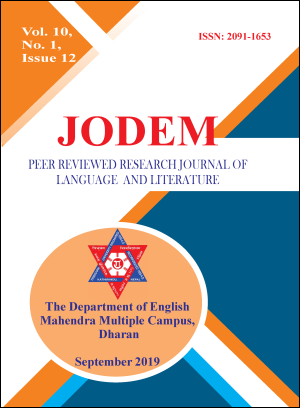Representation of Masculinity in Govinda Raj Bhattarai's Muglan
DOI:
https://doi.org/10.3126/jodem.v12i1.38716Keywords:
Gender roles, masculinity, Nepali literature, patriarchy, performanceAbstract
Patriarchal gender roles provide certain privileges to males. They hold the position of house holder, which provides them access to power and resources, and authority over women and children in the family. Likewise, they get social recognition as the head of the family. But they get these privileges on the condition that they provide and protect their family members as breadwinners. One of the aspects of masculinity is to provide to the needs of the family. Thus, men take risks and accept challenges to earn money so that they can provide for their families. However, while performing the breadwinner role, they are likely to encounter different types of mental and physical threats that may cost them their lives. Govinda Raj Bhattarai's debut novel, Muglan deals with the problems faced by men in patriarchy. Though the protagonist and his companions have emulated the traditional masculinity and hoped to live like men, they fail. Thus, this article aims to analyze the representation of masculinity in the novel to examine the harms of patriarchal gender roles on men. For this, it takes insights from Masculinity Studies, which put forward to inessential approach to gender. This approach suggests that gender is not a natural phenomenon. Rather it is a socially constructed category, and rigid traditional gender roles harm both men and women. The article contributes to understanding the harms of rigid patriarchal gender roles on men.
Downloads
Downloads
Published
How to Cite
Issue
Section
License
© Department of English, Mahendra Multiple Campus, Dharan, Nepal

